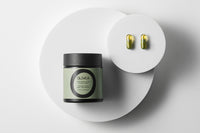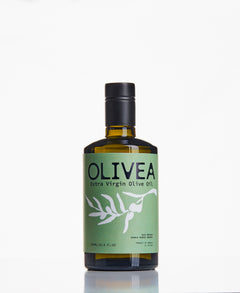Polyphenol-Rich Olive Oil: A Complete Guide to Health Benefits and Science
Are you ready to upgrade your wellness routine with a simple, delicious swap? Polyphenol-rich olive oil is an absolute natural powerhouse for fighting inflammation, boosting heart and brain health, and reducing risk for chronic diseases.
If you're not already drizzling premium extra virgin olive oil on everything from salads to roasted veggies, you're missing out on some major health perks. But don't stress—by the end of this article, you'll understand exactly how olive oil's potent polyphenols can transform your well-being and vascular health from the inside out.
Understanding Polyphenols: Nature's Key Antioxidants
Before we discuss the incredible benefits of olive oil, let's take a moment to understand what makes polyphenols so special.
What are Polyphenols?
Polyphenols are a diverse group of naturally occurring compounds found in plant-based foods like fruits, vegetables, herbs, spices, tea, red wine, and—you guessed it—olives and olive oil. They're characterized by their multiple phenol rings (hence the "poly" prefix) and act as potent antioxidants in the body.

But what exactly do antioxidants do? In a nutshell, they help neutralize harmful molecules called free radicals that can damage cells and contribute to chronic inflammation—a key driver of many diseases. By scavenging these unstable compounds, polyphenols help maintain cellular health and reduce oxidative stress throughout the body.
Polyphenols also possess anti-inflammatory properties, meaning they can help regulate the immune system and prevent chronic low-grade inflammation. This is crucial because persistent inflammation underlies a wide range of health issues, from heart disease and diabetes to neurodegenerative disorders and certain cancers.
Extra Virgin Olive Oil (EVOO): A Polyphenol Goldmine
While many plant foods contain polyphenols, extra virgin olive oil (EVOO) stands out as a particularly rich source. The key polyphenols found in olive oil include:
- Oleocanthal: A potent anti-inflammatory compound that acts similarly to ibuprofen
- Oleuropein: A bitter-tasting antioxidant with antimicrobial and anti-inflammatory effects
- Hydroxytyrosol: A powerful free radical scavenger that protects against oxidative damage
- Tyrosol: Another antioxidant that helps prevent lipid oxidation and supports cardiovascular health

However, it's important to note that not all olive oils are created equal when it comes to polyphenol content. EVOO, which is minimally processed and cold-pressed from high-quality olives, boasts significantly higher polyphenol levels compared to refined or "light" olive oils.
So, now that we've covered the basics of polyphenols, let's explore the specific ways EVOO can benefit your health.
Polyphenol-Rich Olive Oil for Your Heart
One of the most well-established benefits of EVOO is its ability to support heart health. As a cornerstone of the heart-healthy Mediterranean diet, EVOO has been extensively studied for its protective effects against cardiovascular disease.
Improving Cholesterol Profiles
High levels of low-density lipoprotein (LDL) cholesterol, often referred to as "bad" cholesterol, can contribute to the buildup of plaque in the arteries, increasing the risk of heart attack and stroke. Fortunately, the polyphenols in EVOO have been shown to help improve cholesterol profiles by:
- Increasing levels of beneficial high-density lipoprotein (HDL) cholesterol
- Decreasing levels of oxidized LDL, a particularly harmful form of LDL
- Reducing total cholesterol and triglyceride levels

A study published in the Annals of Internal Medicine found that participants who consumed polyphenol-rich olive oil experienced significant increases in HDL cholesterol and decreases in oxidized LDL compared to those who consumed low-polyphenol olive oil.
Promoting Healthy Blood Vessels
The endothelium, the inner lining of blood vessels, plays a crucial role in maintaining cardiovascular health. Endothelial dysfunction, characterized by reduced nitric oxide production and increased inflammation, is a key factor in the development of atherosclerosis and other cardiovascular disorders.
EVOO polyphenols have been shown to improve endothelial function by:
- Increasing nitric oxide production, which helps relax blood vessels and improve blood flow
- Reducing oxidative stress and inflammation in the endothelium
- Inhibiting the expression of adhesion molecules that allow inflammatory cells to stick to the vessel walls

A randomized controlled trial published in the journal Food Chemistry found that consuming polyphenol-rich olive oil significantly improved endothelial function in healthy adults compared to a low-polyphenol control oil.
Keeping Blood Pressure in Check
Hypertension, or high blood pressure, is a major risk factor for heart disease and stroke. The polyphenols in EVOO have been shown to help lower blood pressure by:
- Reducing oxidative stress and inflammation in the blood vessels
- Enhancing nitric oxide production, which helps relax and dilate the arteries
- Modulating the activity of enzymes involved in blood pressure regulation

A meta-analysis of 13 randomized controlled trials found that consuming olive oil, particularly high-polyphenol EVOO, significantly reduced both systolic and diastolic blood pressure compared to control diets.
Polyphenol-Rich Olive Oil for Your Brain
In addition to its heart-healthy benefits, EVOO has also gained attention for its potential to support brain health and cognitive function. The brain is particularly vulnerable to oxidative stress and inflammation, which can contribute to age-related cognitive decline and neurodegenerative diseases like Alzheimer's.
Fighting Oxidative Stress in the Brain
The polyphenols in EVOO, particularly oleocanthal and hydroxytyrosol, have been shown to protect brain cells from oxidative damage by:
- Scavenging harmful free radicals
- Enhancing the activity of antioxidant enzymes in the brain
- Reducing lipid peroxidation, a process that can damage brain cell membranes

An animal study published in the journal Rejuvenation Research found that mice fed a diet enriched with EVOO had significantly higher levels of antioxidant enzymes in their brains compared to those fed a standard diet.
Reducing Neuroinflammation
Chronic inflammation in the brain, known as neuroinflammation, is a key factor in the development and progression of neurodegenerative diseases. The polyphenols in EVOO have been shown to combat neuroinflammation by:
- Inhibiting the production of pro-inflammatory cytokines in the brain
- Reducing the activation of microglial cells, which are involved in the inflammatory response
- Modulating the activity of enzymes involved in the inflammatory process

A study published in the Journal of Nutritional Biochemistry found that oleocanthal, a polyphenol found in EVOO, reduced inflammation and oxidative stress in the brains of mice with Alzheimer's disease.
Supporting Cognitive Function
Given their neuroprotective properties, it's not surprising that EVOO polyphenols have been associated with improved cognitive function in both animal and human studies. For example:
- A study published in the journal Nutrients found that extra virgin olive oil-enriched diets significantly improved working memory and reduced amyloid-beta plaque load in the brain of a mouse model of Alzheimer's disease
- A randomized controlled trial published in the Journal of Neurology, Neurosurgery & Psychiatry found that consuming a Mediterranean diet supplemented with EVOO improved cognitive function in older adults with mild cognitive impairment.
While more research is needed to fully understand the mechanisms behind these cognitive benefits, the evidence suggests that incorporating EVOO into your diet may help keep your brain sharp as you age.
Polyphenol-Rich Olive Oil and Blood Sugar Management
In addition to its benefits for heart and brain health, EVOO may also play a role in regulating blood sugar levels and improving insulin sensitivity, two key factors in the prevention and management of type 2 diabetes.
Enhancing Insulin Sensitivity
Insulin resistance, a condition in which cells become less responsive to insulin's signals to take up glucose from the bloodstream, is a major contributor to the development of type 2 diabetes. The polyphenols in EVOO have been shown to improve insulin sensitivity by:
- Enhancing glucose uptake by cells
- Improving insulin signaling pathways
- Reducing inflammation, which can interfere with insulin sensitivity

A randomized controlled trial published in the journal Diabetes Care found that consuming a Mediterranean diet rich in EVOO improved insulin sensitivity in individuals with metabolic syndrome compared to a low-fat diet [40].
Regulating Blood Sugar Levels
In addition to improving insulin sensitivity, the polyphenols in EVOO have also been shown to help regulate blood sugar levels by:
- Slowing the absorption of glucose in the intestines
- Enhancing the production of glucagon-like peptide-1 (GLP-1), a hormone that stimulates insulin secretion and reduces appetite
- Modulating the activity of enzymes involved in glucose metabolism

A study published in the journal Clinical Nutrition found that adding EVOO to a meal helps improve blood sugar and fat levels after eating in pre-diabetic patients by boosting insulin and gut hormones.
Protecting Against Diabetes Complications
Diabetes can lead to a range of serious complications over time, including cardiovascular disease, kidney damage, and nerve damage. The polyphenols in EVOO may help protect against these complications by:
- Reducing oxidative stress and inflammation, which can contribute to the development of complications
- Improving endothelial function and reducing the risk of cardiovascular disease
- Protecting against diabetic nephropathy, a type of kidney damage associated with diabetes

A study published in the journal Nutrients found that hydroxytyrosol, a polyphenol found in EVOO, reduced markers of oxidative stress and inflammation in individuals with type 2 diabetes.
Polyphenol-Rich Olive Oil Against Cancer
Cancer is a complex disease characterized by the uncontrolled growth and spread of abnormal cells. While many factors contribute to the development of cancer, oxidative stress and chronic inflammation are known to play significant roles.
Inducing Cancer Cell Death
One of the hallmarks of cancer cells is their ability to evade apoptosis, or programmed cell death, which allows them to continue growing and dividing unchecked. The polyphenols in EVOO, particularly oleocanthal and oleuropein, have been shown to induce apoptosis in various types of cancer cells, including:
- Breast cancer cells
- Prostate cancer cells
- Colon cancer cells
- Leukemia cells
An in vitro study published in the journal Nutrition and Cancer found that oleocanthal induced apoptosis in human breast cancer cells by modulating the expression of apoptosis-related proteins.
Inhibiting Cancer Cell Growth
In addition to inducing apoptosis, the polyphenols in EVOO have also been shown to inhibit the growth and proliferation of cancer cells by:
- Modulating the activity of signaling pathways involved in cell growth and division
- Reducing the expression of growth factors and their receptors
- Inhibiting the formation of new blood vessels that supply tumors with nutrients and oxygen

Oleocanthal, a polyphenol found in EVOO, has shown remarkable ability to slow the growth of aggressive human melanoma cells in a laboratory study. Researchers believe oleocanthal disrupts the cancer cell cycle and induces apoptosis, or programmed cell death. By interfering with cell division and triggering self-destruction, oleocanthal may help keep tumor growth in check.
Reducing Oxidative Stress and Inflammation
As mentioned earlier, oxidative stress and chronic inflammation are known to contribute to the development and progression of cancer. The polyphenols in EVOO have been shown to combat these processes by:
- Scavenging harmful free radicals and reducing oxidative damage to DNA
- Enhancing the activity of antioxidant enzymes in the body
- Inhibiting the production of pro-inflammatory cytokines and enzymes

A study published in the International Journal of Oncology found that oleocanthal exerts antitumor effects on cancer cells through the generation of reactive oxygen species (ROS).
Additionally, a review in the International Journal of Molecular Sciences discusses the nutraceutical properties of olive oil polyphenols, highlighting their ability to modulate cellular pathways associated with oxidative stress and inflammation.
Epidemiological Evidence
While in vitro and animal studies have provided promising evidence for the anticancer potential of EVOO polyphenols, epidemiological studies in humans have yielded mixed results. Some observational studies have found an inverse association between olive oil consumption and the risk of certain types of cancer, such as:
- Breast cancer
- Colorectal cancer
- Upper digestive tract cancers
However, other studies have found no significant association or even a slightly increased risk. These inconsistent findings may be due to differences in study design, population characteristics, and the type and quality of olive oil consumed.
Maximizing the Health Benefits of Polyphenol-Rich Olive Oil
To fully reap the health benefits of EVOO, it's essential to choose a high-quality product and incorporate it into your diet strategically.
Choosing the Right EVOO

When shopping for EVOO, look for the following characteristics to ensure you're getting a high-quality, polyphenol-rich product:
- A dark glass or tin container to protect the oil from light and oxidation
- A harvest date within the past year, as the polyphenol content decreases over time
- Certification seals, such as the North American Olive Oil Association (NAOOA) or the European Union's Protected Designation of Origin (PDO) or Protected Geographical Indication (PGI)
- A robust, fruity aroma and a slightly bitter, pungent taste, which are indicators of high polyphenol content
Storing EVOO Properly

To maintain the quality and polyphenol content of your EVOO, it's crucial to store it properly. Follow these tips:
- Store EVOO in a cool, dark place away from heat and light, such as a pantry or cupboard
- Keep the container tightly sealed when not in use to prevent oxidation
- Avoid storing EVOO near the stove or in the refrigerator, as extreme temperatures can degrade the polyphenols
- Use EVOO within 3-6 months of opening for optimal freshness and polyphenol content
Incorporating EVOO into Your Diet

To maximize the health benefits of EVOO, aim to consume 2-4 tablespoons per day. Here are some delicious ways to incorporate EVOO into your meals:
- Use EVOO as a base for salad dressings, marinades, and sauces
- Drizzle EVOO over cooked vegetables, grilled meats, or fish
- Use EVOO in place of butter or other oils when sautéing or roasting
- Dip whole-grain bread into EVOO as a healthy appetizer
It's important to note that while EVOO is a healthy fat, it is still high in calories. Be mindful of portion sizes and use EVOO in place of other fats, rather than in addition to them, to avoid excess calorie intake.
Polyphenol-Rich Olive Oil: Your Daily Dose of Wellness
Polyphenol-rich olive oil is a true superfood with a wide range of potential health benefits. From supporting heart health and brain function to improving blood sugar control and reducing cancer risk, the polyphenols in EVOO have been shown to positively impact nearly every aspect of health.
To maximize the health benefits of EVOO, choose a high-quality product, store it properly, and incorporate it into your diet strategically. By making EVOO a staple in your daily routine, you can enjoy its delicious flavor while nourishing your body with powerful antioxidants and anti-inflammatory compounds.




